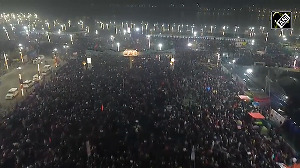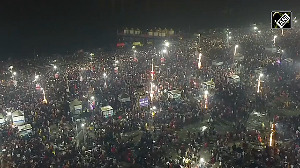For watchers of the growing relations between India and the US, it must certainly have been jarring to see the insularity of the American media.
At a press availability with President Bush and Dr Manmohan Singh July 18, right after what will likely go down in history as a momentous event (the two nations released a joint statement later on cooperation in the civilian nuclear energy sector), reporters from the Indian and American sides were allowed two questions each for the leaders.
Surprise, surprise! One question from the American side was about Karl Rove, the other about the likely Supreme Court justice nominee, never mind the fact that you had the heads of state of the largest and oldest democracies together, ahead of the first state dinner in Bush' second term. (Interestingly, the Associated Press points out that the only other four state dinners have been for Mexico, Poland, Phillipines and Kenya).
Today's joint session to Congress was covered by C-Span, not surprisingly. Some newspapers didn't even bother to have reporters' copy online, choosing to go with wire reports only In fact, The Baltimore Sun didn't even have the nuclear deal story by a staffer, deciding to go with wire reports.
The USA Today also relied on wire reports but combined today's joint session address with yesterday's nuclear agreement they looked at the UN angle July 18 and headlined it this.
The San Francisco Chornicle also only carried wire reports on its website. The only staff bylined story from the press conference was, what else, about Rove! Poor Dr Singh gets a mention in the seventh para thus:
"But Bush, speaking during a news conference with Indian Prime Minister Manmohan Singh " So much for the leader of a billion people
The blinkered view was demonstrated as TV networks continued to follow up on the la affaire Rove, using shots of Singh and Bush from the morning.
In the New York Times, David. Sanger and Richard Stevenson have a large piece on the Rove controversy. Only in the ninth paragraph do they let on that Bush was speaking a press conference with Dr Singh
Curiouser and curiouser it gets. The Boston Globe had a story on the nuclear deal, but the photo on its website, for some odd reason, is of the backs of Dr Singh and President Bush walking down a red carpeted corridor.
Those who did write about visit focused exclusively on the nuclear cooperation angle, throwing in plenty of caveats to ensure readers leave chary of the Bush administrations decision.
IN the Washington Post, Dana Milbank and Dafna Linzer had this to say in the second para (the first was a single sentence woth half of it dedicated to saying how this was a reversal of decades-old US policy)
"The agreement between Bush and Indian Prime Minister Manmohan Singh, which must win the approval of Congress, would create a major exception to the U.S. prohibition of nuclear assistance to any country that doesn't accept international monitoring of all of its nuclear facilities. India has not signed the nuclear Non-Proliferation Treaty, which requires such oversight, and conducted its first nuclear detonation in 1974."
The duo then went straight on to link the deal with North Korea and Iran, never mind India's near-perfect record on non-proliferation Nary a whisper of Dr A Q Khan's global nuke bazaar here.
"Participants in the discussions said there had been debate within the administration about whether the deal with India -- which built its atomic arsenal in secret -- would undercut U.S. efforts to confront Iran and North Korea over their nuclear programs. There were also concerns about how the agreement would be accepted in Pakistan, India's regional rival and an ally in the U.S. campaign against al Qaeda."
Nowhere do they mention that this is a long-term solution to India's growing energy needs. Nor does anyone seem to have appreciated the fact that if India, one of the fastest growing economies in the world, could reduce its dependence on oil, currently at $60 a barrel and likely to rise, it would make things easier on the US (which is also opposing Indian plans to buy oil from Iran).
Instead, Milbank and Linzer raise the specter of proliferations: "The agreement does not call for India to cease production of weapons-grade plutonium, which enables India to expand its nuclear arsenal."
The duo conveniently ignore India's self-imposed ban on further testing, a fact that The Los Angeles Times's Varren Vieth points out:
"U.S. officials said they agreed to the new aid after India pledged for the first time to accept international oversight of its civilian nuclear program and continue its moratorium on nuclear weapons testing. In the past, Washington has rebuffed requests for nuclear assistance because India has refused to sign the Nuclear Nonproliferation Treaty."
To his credit, Vieth also gives the laundry list of other programs agreed to fairly early in the story:
"Besides the civilian nuclear agreement, the two leaders approved programs to promote democracy, fight terrorism, combat AIDS, increase trade in high technology and collaborate on disaster relief, energy development, scientific research, space exploration and satellite projects."
The New York Times' Steven R Weisman looks at the possible objections the deal could run into:
' "Why should the United States sell controlled nuclear goods to India?" asked Representative Edward J. Markey, Democrat of Massachusetts after announcement of the agreement. "We cannot play favorites, breaking the rules of the nonproliferation treaty to favor one nation at the risk of undermining critical international treaties on nuclear weapons." '
Really? No playing favorites? That sounds really fair and balanced!
It was left to old India hand Stephen Cohen, senior fellow in the Foreign Policy Studies Program at The Brookings Institution and author of India: Emerging Power, to put things in perspective in an online chat on the Post website today. Take this exchange for example:
"Washington, D.C.: Do you think that the U.S. Congress will pass the law allowing U.S. Nuclear Technology/Materials to go to India? I am wondering since Pakistan would also lobby in Congress to make sure it is not passed.
Stephen Cohen: Answered this earlier, I think it is likely to pass. Pakistan itself might benefit if it can demonstrate that it has really cleaned up its nuclear act and is behaving like a responsible nuclear weapon state. This would have to include full transparency regarding Dr. AQ Khan."
Anyone still want to play favorites?






 © 2025
© 2025